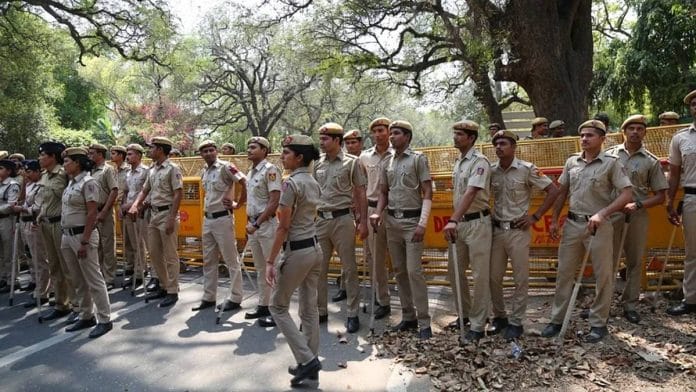New Delhi: Delhi Police launched a community awareness programme Monday, aimed at educating the common people about the newly implemented criminal laws. Sessions were held at several police stations across the national capital last evening.
The new laws — Bharatiya Nyaya Sanhita (BNS), Bharatiya Nagarik Suraksha Sanhita (BNSS) and Bharatiya Sakshya Adhiniyam (BSA), which replaced the Indian Penal Code, Criminal Procedure Code and Indian Evidence Act, respectively — came into effect on 1 July.
According to police officers, a lack of comprehensive understanding of the new laws among the public could create significant problems for them.
Senior police officers said that members of resident welfare associations, local leaders, students and traders were invited to attend the sessions, where they were informed about the sections of the new laws and encouraged to spread awareness among others.
At the Jama Masjid police station, the hour-long awareness session was attended by 70 of the 100 people invited. A senior officer at this station told ThePrint that the police feared that the people might not be aware of the new legislation and could be confused about the sections.
The officer added that these sessions would be conducted through the week, during which the attendees would be informed about the key changes in the new laws, such as how the section which prescribes the punishment for murder, IPC Section 302, has now been replaced by BNS Section 103.
There were also concerns about the possibility of people questioning the validity of the police’s actions due to their lack of awareness. This is why the awareness programme was launched, police officers said.
“Our biggest concern is that people might create obstacles in our work in the future. Due to the lack of information, they might question us about the changes in the sections which would be applicable against them. This would waste our time. We need to prepare people for this,” said an officer at the police station at New Delhi Railway Station.
Also Read: 19 yrs after disbanding state transport service, MP govt looks at fixes for rural connectivity
Training the police
Police officers appear both curious and nervous about the implementation of these laws.
On 1 July, as soon as the new laws came into force, the New Delhi Railway Station police station received a complaint of Aadhaar card theft at 2.06 am, and filed its first FIR under BNS Section 303(2).
“As we start working, we will encounter new challenges, and we will address them as they come,” said the officer at New Delhi Railway Station on the condition of anonymity.
According to this officer, any challenges with respect to the new laws will have to be faced by the investigating officers, who are mostly stationed on ground and will be responsible for applying the sections.
“Things change so fast on the field that we have to react quickly. In such a situation, we also have to apply sections quickly. Memorising all the new sections will prove to be a big challenge,” an investigation officer at the Paharganj police station told ThePrint on the condition of anonymity.
Another investigation officer at Kamla Nagar, however, questioned the new procedures mandated by the new laws. He wondered whether an officer should worry about apprehending the offender or recording a video for evidence, if one is at the crime scene alone.
The senior officer at Jama Masjid also expressed concerns that officers may prove to be inadequate in capturing video and audio evidence while collecting proof, as many have not been properly trained in these skills.
However, Delhi police are confident of the effective implementation of the new laws on ground. Officers claimed that they had been undergoing training since January this year for efficient enforcement.
According to government sources, more than 6,31,305 people were trained across the country ahead of the implementation. Among these, 6,06,986 were police officers, 3,642 were prosecutors, 8,172 were from the judiciary, 1,637 from forensic departments, and 10,868 were prison officers.
“We have undergone several rounds of training, where we have been taught about the sections of the new laws. This training has been conducted by lawyers. Now, we are fully prepared,” said an investigation officer at Paharganj station.
The officer at New Delhi Railway Station acknowledged that memorising the new laws might be challenging due to their complexity and that adopting new procedures would take time. He said that if he were to encounter a hurdle, he would have the hard copies of the laws, issued by the government to officers, to guide him.
He said that the sections of the laws have also been incorporated into the computer systems at the police stations. As soon as keywords like rape or murder are entered, the relevant sections appear on the screens.
“The new laws will make the police’s job easier. Now, there won’t be as much burden,” the officer said.
(Edited by Mannat Chugh)
Also Read: Sexual harassment accused Hari Padman terminated by Kalakshetra, to contest dismissal in Madras HC






